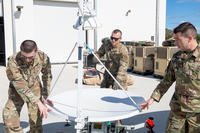The Czechs may have agreed today to accept a missile defense radar site, but Poland is very unlikely to sign an agreement with the United States to base missile defense interceptors on its territory. Neither side has agreed to break off talks yet but we hear scant signs of progress.
The Pole's reluctance to say yes comes as Congress appears ready to accept that the modified interceptors that would be stationed in Poland have an acceptable test plan, though one congressional aide noted that it was "very tight." The test plan is needed because these missiles have one less stage than do the interceptors currently stationed in Alaska and California and would require some modifications.
The test campaign would a booster flight test in fiscal 2009 and an intercept in fiscal 2010. "Based on those two tests they could certify that the missile works," the aide said. A third intercept would also be required, along with tests of all the ground equipment. Perhaps the most interesting wrinkle in all this is that the Sm-3 Block 2 missile may win more business because of the Pole's reluctance to accept the proposed site.
This aide noted that the radar based in the Czech Republic can be used for other purposes, like Aegis." While the current missile would not be appropriate to the mission, this aide said the SM-3 Block 2 missile would work and could even be land-based. The Block 2 probably will not be ready until 2013 at the earliest, with 2015 a reasonable goal. That contrasts with the 2012 deployment target for the Ground Based Midcourse system in Poland
Meanwhile, NATO is analyzing what missile defense systems should be used to protect the southern flank countries such as Bulgaria, Greece and Turkey. That report is expected next year.







